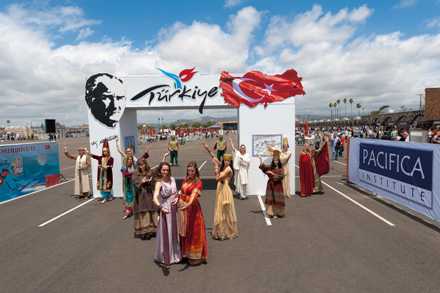By CAROLINE B. GLICK
10/03/2011 23:39
The only thing Israel really needs to be concerned about is the US’s continued insistence that Turkey is a model ally in the Islamic world.
To the naked eye, Turkish Prime Minister Recep Tayyip Erdogan seems to be moving from strength to strength.
Erdogan was welcomed as a hero on his recent trip to Egypt, Tunisia and Libya. The Arabs embraced him as the new face of the war against Israel.
The Obama administration celebrates Turkey as a paragon of Islamic democracy.
The Obama administration cannot thank Erdogan enough for his recent decision to permit NATO to station the US X-Band missile shield on its territory.
The US is following Turkey’s lead in contending with Syrian President Bashar Assad’s massacre of his people.
And according to Erdogan, the Obama administration is looking into ways to leave its Predator and Reaper UAVs with the Turkish military when US forces depart Iraq in the coming months.
Turkey requires the drones to facilitate its war against the Kurds in Iraq and eastern Anatolia. The Obama administration also just agreed to provide Turkey with three Super Cobra attack helicopters.
Despite its apparent abandonment of Iran’s Syrian client Assad, Turkey’s onslaught against the Kurds has enabled it to maintain its strategic alliance with Iran. Last month Erdogan announced that the Turkish and Iranian militaries are cooperating in intelligence sharing and gearing up to escalate their joint operations against the Kurds in Iraq.
Erdogan is probably the only world leader that conducted prolonged friendly meetings with both Iranian President Mahmoud Ahmadinejad and US President Barak Obama at the UN last month.
Then there are the Balkans. After winning his third national election in June, Erdogan dispatched his Foreign Minister Ahmet Davutoglu to Kosovo, Bosnia and Romania to conduct what the Turks referred to as “mosque diplomacy.”
Erdogan’s government has been lavishing aid on Bosnia for several years and is promoting itself as a neo-Ottoman guardian of the former Ottoman possessions.
EVEN ERDOGAN’S threats of war seem to be paying off. His attacks on Israel have won him respect and admiration throughout the Arab world. His threats against Cyprus’s exploration of offshore natural gas fields caused Cypriot President Demetris Christofias to announce at the UN that Cyprus will share the revenues generated by its natural gas with Turkish occupied northern Cyprus.
Christofias said Cyprus would do so even in the absence of a unification agreement with its illegally occupied Turkish north. Moreover, due to Turkish pressure, Cyprus has agreed to intensify reunification talks with the Turkish puppet government in the northern half of the island. Those talks were set to begin in Nicosia last Tuesday.
Then there is the Turkish economy.
On the face of it, it seems that Turkey’s assertive foreign policy is facilitated by its impressive economic growth.
According to Turkey’s statistics agency, the Turkish economy grew by 8.8 percent in the second quarter of the year – far outperforming expectations. Last year the Turkish economy grew by 9 percent. With this impressive data, Erdogan is able to make a seemingly credible case to the likes of Egypt that it can expect to be enriched by a strategic partnership with Turkey.
For Israelis, these achievements are a cause for uneasiness. With Turkey building itself into a regional powerhouse largely on the back of its outspoken belligerency towards Israel, many observers argue Israel must do everything it can to mend fences with Turkey. Israel simply cannot afford to have Turkey angry at it, they claim.
If Turkey’s position was as strong as the conventional wisdom claims, then maybe these commentators and politicians would have a point. But Turkey’s actual situation is very different from its surface image.
Turkey’s aggressive, peripatetic foreign policy is earning Ankara few friends.
Erdogan’s threat to freeze Turkish-EU relations if the EU goes ahead as planned and transfers its rotating presidency to Cyprus next July has backfired.
European leaders wasted no time in angrily dismissing and rejecting Erdogan’s threat. So too, Germany and France have been loudly critical of Turkey’s belligerence towards Israel.
Then there is Cyprus. Turkey’s ever escalating threats to attack Cyprus’s natural gas project have angered both the EU and Russia. The EU is angry because as an EU member state, Cypriot gas will eventually benefit consumers throughout the EU, who are currently beholden to Russian suppliers and Turkish pipelines.
Russia itself has announced it will defend Cyprus against Turkish threats.
Russia is annoyed by Turkish courtship of the Balkan states. It sees no reason to allow Turkey to throw its weight around in Cyprus. Doing so successfully will only strengthen Ankara’s appeal in the Balkans and among the Turkic minorities in Russia.
THIS BRINGS us to the Muslim world. Despite Erdogan’s professions of friendship with Iran, it is far from clear that their alliance is as smooth as he presents it. The Iranians are concerned about Turkish ascendance in the Middle East and angry at Turkey for threatening Syria.
In truth if Assad is able to ride out the current storm and remain in power, he will owe his survival in no small measure to Turkey. Since the riots broke out in the spring, Turkey has restrained Washington from taking any concerted steps to overthrow the Syrian dictator.
Had it not been for Erdogan’s success in containing the US, it is possible the US and Europe might have acted swiftly to support the opposition.
But whether he stays in power or is overthrown, it is doubtful that Assad will feel any gratitude towards Erdogan.
Rather, Assad will likely blame Erdogan for betraying him. And if Assad is toppled, the Kurds of Syria could easily forge alliances with their brethren in Turkey, Iraq and Iran, to Turkey’s strategic detriment.
Since former Egyptian president Hosni Mubarak was overthrown in February, Turkey has been making a concerted effort to build an alliance with the Egyptian Muslim Brotherhood.
Ankara has reportedly transferred millions of dollars in aid to the Islamic group, and of course continues to support Hamas as well as Hizbullah.
Yet for all of his efforts on the Muslim Brotherhood’s behalf, the Brotherhood issued a sharp rebuke of Erdogan during his visit to Egypt. Brotherhood leader Essam el-Arian rejected Erdogan’s call for Egypt to adopt the Turkish model of Islamic democracy as too secular for Egypt.
As for the Turkish economy, a closer analysis of its financial data indicates that Turkey’s expansive growth is the result of a credit bubble that is about to burst. According to a Citicorp analyst quoted in The Wall Street Journal, domestic demand accounts for all of Turkey’s economic growth.
This domestic demand in turn owes to essentially free loans the government showered on the public in the lead-up to the June elections. The loans are financed by government borrowing abroad.
Turkey’s current accounts deficit stands at nearly 9 percent of GDP.
Greece is engulfed in a debt crisis with a current accounts deficit of 10 percent.
Analysts project that Turkey’s deficit will eclipse Greece’s within the year. And whereas the EU may end up bailing Greece out of its debt crisis, Turkey has no one to bail it out of its own debt crisis.
Consequently, Turkey’s entire economic house of cards is likely to come crashing down very rapidly.
It is hard to understand why Erdogan is acting as he is given the poor hand he is holding. It is possible that he is crazy.
It is possible that he is so insulated from criticism that he is unaware of Turkey’s economic realities or of the consequences of his aggressive behavior. And it is possible that he is hoping to combine a foreign policy crisis with Turkey’s oncoming economic crisis in order to blame the latter on the former. And it is possible that he believes that US backing gives him immunity to the consequences of his actions.
No matter what stands behind Turkey’s actions, it is clear Ankara has overplayed its hand. Its threats against Israel and Cyprus are hollow. Its hopes to be a regional power are faltering.
The only thing Israel really needs to be concerned about is the US’s continued insistence that Turkey is a model ally in the Islamic world. More than anything else, it is US support for Turkey that makes Erdogan a threat to the Jewish state and to the region.
[email protected]
https://www.jpost.com/Opinion/Columnists/Our-World-Turkeys-house-of-cards





